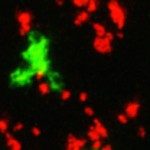Lien vers Pubmed [PMID] – 30266340
Immunity 2018 Sep;
Recruitment of immune cells with antimicrobial activities is essential to fight local infections but has the potential to trigger immunopathology. Whether the immune system has the ability to sense inflammation intensity and self-adjust accordingly to limit tissue damage remains to be fully established. During local infection with an intracellular pathogen, we have shown that nitric oxide (NO) produced by recruited monocyte-derived cells was essential to limit inflammation and cell recruitment. Mechanistically, we have provided evidence that NO dampened monocyte-derived cell cytokine and chemokine production by inhibiting cellular respiration and reducing cellular ATP:ADP ratio. Such metabolic control operated at the tissue level but only when a sufficient number of NO-producing cells reached the site of infection. Thus, NO production and activity act as a quorum sensing mechanism to help terminate the inflammatory response.


